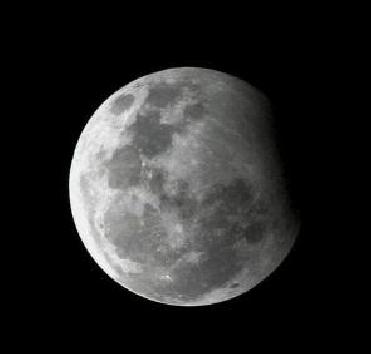
A view of the partial lunar eclipse, in Indore . Image Credit: PTI.
NEW DELHI (PTI): On a full blue moon day tonight, skywatchers will find lunar radiance rather dim as the country witnesses a partial lunar eclipse.
A partial lunar eclipse occurs when only part of the Moon passes through the umbra, or darkest part, of Earth's shadow, Science Popularisation Association of Communicators and Educators (SPACE) Director C B Devgun told PTI.
The eclipse will begin when the Moon enters penumbra at 10:47 PM and ends at 02:58:11 AM, Nehru Planetarium Director N Rathnasree told PTI.
The start of the partial eclipse will be at 00:22:43 AM on January 1, 2010 and will end at 01:22:41 AM.
Although the partial phase of the eclipse lasts for an hour, only 7 per cent of the diameter of the Moon is covered by the umbral shadow of the Earth, which is too negligible to be easily visible, she added.
When a second full moon in a calendar month appears in the night sky, the occurrence is known as a blue moon.
There are 12 full moons most years but every two or three years there is an extra full moon which is called a blue moon.
Such an eclipse of the Moon will be difficult to discern with the naked eye. Although an astrophotograph of the Moon might just show a hint of darkening over a very tiny region of the Moon, Rathnasree said.
The astronomical event will also be observed in all of Asia and Europe, major parts of Africa and small portion of south western Australia, Devgun said.
The beginning, the middle and the ending of the eclipse will be visible from all parts of India, he said.
The eclipse will be visible in the region covering Alaska, Australia, Indonesia, Asia, Africa, Europe, including the British Isles and the Arctic regions.
The beginning of the umbral phase will be visible from the extreme south-eastern part of Australia, middle of South and North Pacific Ocean and extreme Solomon Island.
The ending of the umbral phase will be visible from North and South Atlantic Ocean and Greenland.
The eclipse occurring tomorrow will have the magnitude of 0.082, Devgun said.
The year saw three penumbral lunar eclipses on February 9, July 7 and August 6.
The last time a lunar eclipse took place on a New Year day was in the year 1741, Prof R C Kapoor of Indian Institute of Astro Physics told PTI.
 Previous Article
Previous Article













The Indian Air Force, in its flight trials evaluation report submitted before the Defence Ministry l..
view articleAn insight into the Medium Multi-Role Combat Aircraft competition...
view articleSky enthusiasts can now spot the International Space Station (ISS) commanded by Indian-American astr..
view article